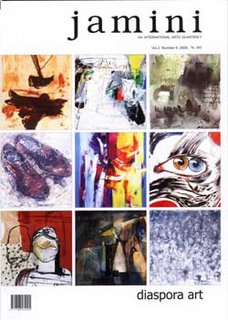Preeta Krishna (India) is the winner of the
2005 Commonwealth Short Story Competition (administered by the CBA or Commonwealth Broadcasting Association) for her story 'Treason', which deals with the loss of innocence in a harsh world. Three other Indian (or PIO) writers--Mareet Sodhi Someshwar (Hong Kong), Swapna Kishore and Suchitra Ramadurai--have won in the category of Highly Commended stories.
Did you know about this competition?
I guess many have not heard about it. I am sure with time and more exposure, literary prize watchers will put it under their radars as they do about the
Commonwealth Writers Prize (for the novels and administered by the Commonwealth Foundation, an intergovernmental organization). Remember the controversy about the Commonwealth Writers Prize for a novel by Amitava Ghosh. Ghosh had refused to take it for political reasons.
Rushdie wrote a scathing essay on the idea of Commonwealth literature in his collection of essays, Imaginary Homelands. The title of his essay was "Commonwealth Literature does not exist." Rushdie makes his point very clear in these words:
"The nearest I could get to a definition sounded distinctly patronizing: 'Commonwealth literature,' it appears, is that body of writing created, I think, in the English language, by persons who are not themselves white Britons, or Irish, or citizens of the United States of America..."
He further says: "By now 'Commonwealth literature' was sounding very unlikable indeed. Not only was it a ghetto, but it was actually an exclusive ghetto. And the effect of creating such a ghetto was, is, to change the meaning of the far broader term 'English Literaure' ...into something far narrower, something topographical, nationalistic, possibly even racially segregationist."
One may agree or disagree with Rushdie's observations, but the fact remains that such venues are big confidence boosters for the young and fledgling writers.
Seems a lot of people from the Commonwealth countries participated in it. The winner, Preeta Krishna, is joined by twenty-five other writers from across the Commonwealth who have won prizes in the competition. Their stories are being published in a CD-Rom format.
Before you jump to type Preeta Krishna in your google search engine, let me tell you that there isn't much info on her on the net. In case you find something on her, don't forget to share it with me.

